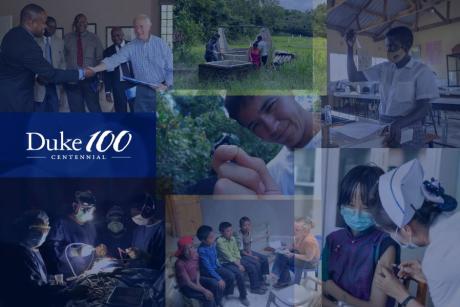Megan von Isenburg is Associate Director of Public Services - Information Services at the Duke University Medical Center Library and serves as the liaison to Global Health and Graduate Medical Education. von Isenburg returned from a visit to the Duke-KCMC partnership in Moshi, Tanzania, where DGHI and the Kilimanjaro Christian Medical Centre have received a $10 million grant to enhance medical education. The following are her reflections from her trip:
“As part of the KCMC-Duke Medical Education Partnership Initiative (MEPI) Grant, I traveled to Moshi, Tanzania, to conduct a needs assessment of the KCMC library and to work with librarian Neema Mosha on potential solutions that could improve access to health information at KCMC.
In my week at KCMC, I reviewed the library facility and collections, observed classes and clinical teaching, interviewed several students, and worked with faculty and trainees. I led two training sessions: an introduction to HINARI, a digital library created by a partnership between the World Health Organization and journal publishers that is available for free to low-income countries, and an advanced session on searching the medical literature through PubMed. To assist with individual’s research projects, I also offered research consultation services, which proved to be in high demand.
I found that the library is very popular with students. They visit regularly to access textbooks, which cannot currently be checked out, and to take advantage of the wireless access within the facility. Books are currently more popular than print journals or any electronic resources, even though the books at the library are not always those recommended to students by faculty. Since all materials at the library are donations, the materials do not always align with the College’s curriculum.
There was fairly low reported usage and awareness of HINARI, though the attendance at the training session indicates a great interest in its potential. Currently internet access on campus is either unavailable or very slow; however, through the MEPI grant, fast speed internet is being brought to campus via an underground cable. This will enable much faster access to the electronic journals and other resources in the HINARI library.
In an effort to support the goals of the MEPI grant and to facilitate greater access to health information within both medical education and the clinical facilities, KCMC librarian Neema Mosha has proposed a number of initiatives. Amongst these are leading HINARI training sessions for faculty and students, creating a web presence for the library, digitizing original KCMC research (including theses, dissertations and proceedings), and automating the library so that books can be checked out.
It is an ambitious plan. As the only librarian at KCMC, Ms. Mosha will likely need support to make it happen. One way we hope to find support is through building a network of librarians at all the MEPI-funded institutions. This would allow librarians from across Africa to share ideas, resources, and best practices. I look forward to working with Ms. Mosha to build this group in the months ahead.”



